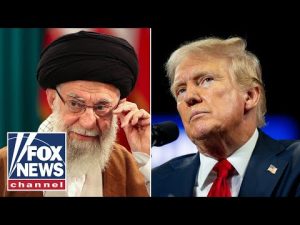As President Trump takes a victory lap, confidently declaring the past three months possibly the best ever for a U.S. president, there’s a noticeable air of optimism—and perhaps a dash of audacity—in Washington. With foreign leaders queueing up on the White House doorstep, it seems the world is eager to engage in new trade talks. It’s almost as if the rest of the globe just woke up to the brilliance of American trade policies, or perhaps they’re just captivated by the possibility of avoiding further tariffs.
The president’s recent meetings with Japanese delegates and upcoming discussions with Italy’s prime minister underline a strategic move to solidify relationships with close allies. This strategy is cleverly paired with a subtle but firm isolation of China, nudging them back to the table for what might be the deal of a lifetime—or at least until the next big trade summit. It’s a game of chess where America makes the rules and everyone else just tries to keep up.
Meanwhile, the topic of tariffs continues to stir debate. Fed Chairman Jerome Powell has expressed concerns, warning that these economic strategies could hike inflation and slow growth. It’s a refreshing moment of candor from someone tasked with maintaining fiscal sanity. Yet the president remains unconvinced, suggesting that perhaps Powell’s termination might arrive a little sooner than expected. One can’t help but admire the president’s determination to do things his way, even if it means reshuffling a few chairs at the Fed.
Speaker of the House Lisa McClain joins the chorus, advocating for tax cuts and heralding the economic boost they might bring, especially to manufacturing-driven states like Michigan. Her enthusiasm for Trump’s tax policies is palpable, especially when it comes to avoiding what could be the most significant tax hike the country has seen in decades. It’s a straightforward argument: lower taxes mean more jobs and happier constituents. Who could argue against that?
Amidst all the economic maneuverings and strategic alliances, Republicans are faced with their own internal narrative. The idea of raising taxes, even slightly, sends shivers down the spine of a party long dedicated to their reduction. Yet, as McClain highlights, there’s little appetite in Congress for such a move. Instead, the focus remains on ironing out inefficiencies and cleaning up the financial deadwood. One thing’s clear: for now, this administration is barreling forward on a path paved with trade negotiations and tax cuts, daring anyone to stand in the way of what promises to be a rather entertaining spectacle.







